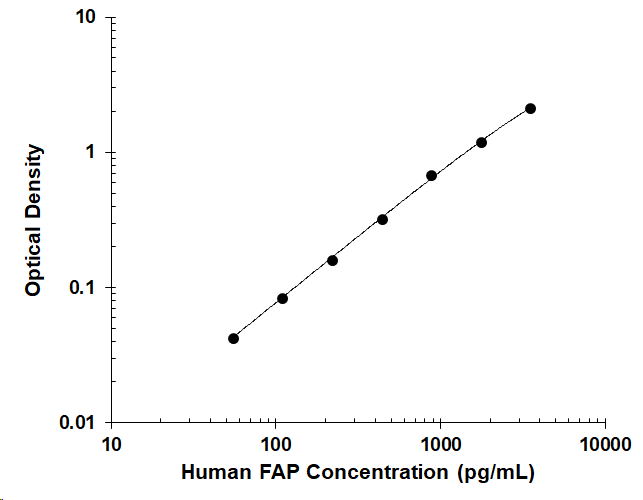Fibroblast Activation Protein alpha/FAP: ELISA Kits
FAP (also known as seprase) is a transmembrane serine protease, and a soluble and enzymatically active form of FAP known as antiplasmin-cleaving enzyme (APCE) circulates in human plasma. FAP is expressed on reactive stromal fibroblasts in tumor tissue and wound healing and on synoviocytes in rheumatoid arthritis. It exhibits dipeptidyl peptidase activity with substrate specificity similar to DPPIV/CD26, which is specific for N-terminal Xaa-Pro sequences. FAP is also an endopeptidase that can degrade Gelatin, Collagens I and IV, Fibronectin, and Laminin as well as several peptide hormones (e.g. Neuropeptide Y, Brain Natriuretic Peptide, Substance P, Peptide YY, and Incretins). The enzymatic activity is dependent on FAP association with DPPIV on the cell surface. The matrix-dedgrading activity of FAP contributes to tumor cell migration and invasion. In addition, FAP can enhance tumor cell growth by limiting the development of anti-tumor immunity.
5 results for "Fibroblast Activation Protein alpha/FAP ELISA Kits" in Products
5 results for "Fibroblast Activation Protein alpha/FAP ELISA Kits" in Products
Fibroblast Activation Protein alpha/FAP: ELISA Kits
FAP (also known as seprase) is a transmembrane serine protease, and a soluble and enzymatically active form of FAP known as antiplasmin-cleaving enzyme (APCE) circulates in human plasma. FAP is expressed on reactive stromal fibroblasts in tumor tissue and wound healing and on synoviocytes in rheumatoid arthritis. It exhibits dipeptidyl peptidase activity with substrate specificity similar to DPPIV/CD26, which is specific for N-terminal Xaa-Pro sequences. FAP is also an endopeptidase that can degrade Gelatin, Collagens I and IV, Fibronectin, and Laminin as well as several peptide hormones (e.g. Neuropeptide Y, Brain Natriuretic Peptide, Substance P, Peptide YY, and Incretins). The enzymatic activity is dependent on FAP association with DPPIV on the cell surface. The matrix-dedgrading activity of FAP contributes to tumor cell migration and invasion. In addition, FAP can enhance tumor cell growth by limiting the development of anti-tumor immunity.
| Sensitivity: | 0.219 ng/mL |
| Applications: | ELISA |
| Assay Range: | 0.625 - 40 ng/mL (Cell Culture Supernates, Cell Lysates, Serum, EDTA Plasma, Heparin Plasma) |
| Sensitivity: | 9.01 pg/mL |
| Assay Range: | 54.7 - 3,500 pg/mL (Cell Culture Supernates, Serum, EDTA Plasma, Heparin Plasma) |
| Assay Range: | 62.5 - 4,000 pg/mL |
| Applications: | ELISA |
| Assay Range: | 93.8 - 6,000 pg/mL |
| Applications: | ELISA |
For use in catalog number QK3715




